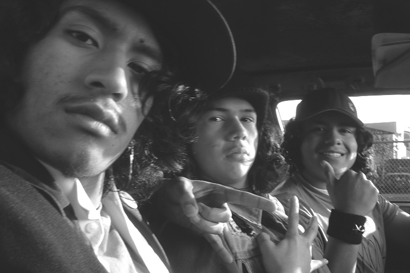Surrounded by annoying gringos, white and black
Photographer/director Larry Clark’s fans consider him a provocative maverick, but until now his films have been deeply conservative. Simultaneously, they objectify and demonize youth, combining moralism and prurience in a way that feels deeply American. For him, teen sex is both very dangerous and very hot. He’s quite skilled at creating an aura of reality, especially through his use of nonprofessional actors, and Clark claims that his stories are based on observation; but his debut, “Kids,” still plays like a sensationalistic fantasy.
This surface naturalism can lead viewers to believe that it’s an accurate depiction of contemporary youth. Infamously, New York Times critic Janet Maslin called “Kids” a wake-up call to the world, implying that Africans should stop worrying about their own problems with AIDS and start pondering the plight of rich, stupid New York teens.
With “Wassup Rockers,” Clark takes an unexpected leap into a previously unknown realm—empathy for his characters. It’s the first Clark film I haven’t hated.
The opening scenes of “Wassup Rockers” promise more of the filmmaker’s usual fare.
It begins with a split-screen interview with Jonathan (Jonathan Velasquez), a shirtless teenager. Afterwards, a young man is killed in a drive-by, an incident that’s never explained. It’s simply a sign that life in South Central Los Angeles is dangerous. After that, the film introduces us to a group of seven Latino kids, including Jonathan and his friends. While they attend school, they live for skateboarding and playing punk rock. Rejecting the hip-hop culture around them, they wear tight jeans and keep their hair long, in the style of the Ramones.
For its first half, “Wassup Rockers” observes their daily lives with little narrative focus, but it takes a turn into comedy when they venture into Beverly Hills to go skating. Attempting to drive there, they get stopped by cops—none of them has a driver’s license—and are forced to use public transportation. After a blissful interlude on their skateboards, they get harassed by the police once again and wind up on a whirlwind tour of suburban backyards, trying desperately to get home safely.
“Wassup Rockers” drops the documentary conceit after its first scene, but Clark succeeds in creating the feeling that we’re watching life happen around us rather than following a story. Artifice makes its presence known in the second half, which draws overtly from Frank Perry’s “The Swimmer” and Walter Hill’s “The Warriors,” but also recalls early ‘80s teen sex comedies. Perhaps it’s no accident that one of the skaters is nicknamed “Porky.”
Compared to the sex-crazed, drug-addled kids of Clark’s previous work, Jonathan and his friends are saints. They may talk about sex and drink a few beers in between skate sessions, but they don’t deflower 12-year-old virgins, spread HIV, or rape unconscious girls. Clark is well known for befriending his adolescent cast members by hanging out with them, a practice that paid off in the convincing performances he got here.
Even the crasser elements of “Wassup Rockers” stem from over-identifying with its characters’ perspective. Anglos and African-Americans alike are treated as threatening annoyances. There’s only one exception—a rich white girl with whom Kico (Francisco Pedrosa) has a lengthy bedroom conversation.
In Beverly Hills, the skaters are tormented by cops and a Clint Eastwood look-alike who shoots at them; more problematically, they’re lusted after by a gay photographer and drunken middle-aged woman. The photographer’s malign presence—he spies on his party guests as they urinate—seems designed to throw attention away from the homoerotic aspects of Clark’s work. The director passes up the opportunity to critique his own exploitative tendencies, instead displacing them onto heavily caricatured women and gay men.
“Wassup Rockers” may be highly flawed, but it’s a major step forward for Clark. For once, he effectively conveys the ecstasy that skateboarding represents for his characters. The punk soundtrack is well used. Clark’s examination of inter-minority tensions may be blunt—and some may be offended by his depiction of almost all African-Americans as gun-waving gangstas, although rich whites take the brunt of his ridicule—but it’s far superior to the facile ironies and Screenwriting 101 gimmicks of Paul Haggis’ “Crash.”
As it progresses, “Wassup Rockers” grows increasingly cartoonish, but the thrill of its final homecoming is very real. Without abandoning his tendency to objectify teenage bodies, Clark has foregone sensationalism in favor of wit—far more successfully than his previous attempts, when he seemed to be laughing at his characters—and a palpable respect for his protagonists and the actors who play them. He still has a long way to go, but “Wassup Rockers” leads me to believe that his films might one day match the quality of his photos.
gaycitynews.com

































